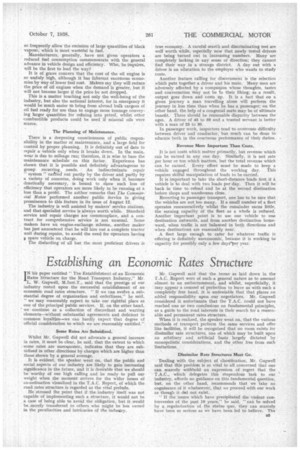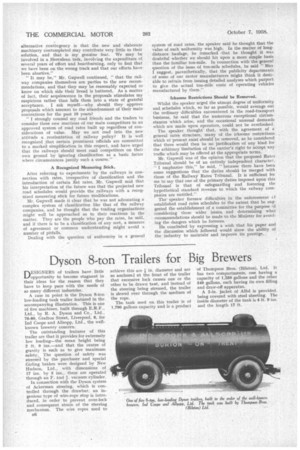Establishing an Economic Rates Structure
Page 39

Page 40

If you've noticed an error in this article please click here to report it so we can fix it.
IN his paper entitled "The Establishment of an Economic Rates Structure for the Road Transport Industry," Mr. L. W. Gupwell, M.Inst.T.. said that the prestige of our industry rested upon the successful establishment of an economic road rates structure. " If we can evolve a substantial degree of organization and orderliness," he said, " we may reasonably expect to take our rightful place as one of the principal public services. If, on the other hand, ' we continue as a collection of discordant and warring elements--without substantial agreements and deficient in common loyalties—ewe can hardly expect that degree cf official consideration to which we are reasonably entitled."
Some Rates Are Subsidized.
Whilst Mr. Gupwell did not advocate a general increase in rates, it must be clear, he said, that the extent to which some rates are uneconomic, indicates that they are subsidized in other directions by charges which are higher than those shown by a general average.
It is evident, the speaker went on, that the public and social aspects of our industry are likely to gain increasing significance in the future, and it is desirable that we should be worthy of our high calling and be ready to pull our weight when the moment arrives for the wider issues of co-ordination visualized in the T.A.C. Report, of which the road rates structure is regarded as the vital prelude. He stressed the point that if the industry itself was not capable of implementing such a structure, it would not be a case of being able to avoid the obligation, but it would be, merely transferred to others who might be less versed in the peculiarities and intricacies of the industry. Mr. Gupwell said that the terms as laid down in the T.A.C. Report were of such a general nature as to amount almost to an embarrassment, and whilst, superficially, it may appear a counsel of perfection to leave us with such a completely free hand, it is undeniable that that places an added responsibility upon our negotiators. Mr. Gupwell considered it unfortunate that the T.A.C. could not have reached one or two conclusions on fundamental principles, as a guide to the road interests in their search for a reasonable and permanent rates structure.
When it is realized, the speaker went on, that the various methods of transport perform the same services and offer like facilities, it will be recognized that no room exists for dissimilar rate structures, one of which may be built upon an arbitrary and artificial basis largely dictated by monopolistic considerations, and the other free from such limitations.
Dissimilar Rate Structures Must Go.
Dealing with the subject of classification, Mr. Gupwell said that this problem is so vital to all concerned that one can scarcely withhold an expression of regret that the T.A.C., which delegates this stupendous task to our industry, affords no guidance on this fundamental question, but, on the other hand, recommends that we take no cognizance of it whatsoever, that we proceed with our work as though it did not exist.
" If the issues which have precipitated the violent controversies of the past 10 years," he said, "can he solved by a regularization of the status quo, they can scarcely /have been so serious as we have been led to believe. The alternative contingency is that the new and elaborate machinery contemplated may contribute very little to their solution, and that is my genuine fear. We may be involved in a Herculean task, involving the expenditure of several years of effort and heartburning, only to find that we have been on the wrong track and that our efforts have • been abortive."
" It may be," Mr. Gupwell continued, " that the railway companies themselves are parties to the new recommendations, and that they may be reasonably expected to know on which side their bread is buttered. As a matter of fact, their acquiescence in the proposals stimulates my suspicions rather than lulls them into a state of grateful acceptance. I ask myself—why should they approve proposals which amount to the abandonment of their main contentions for the past 10 years? "I strongly counsel my road friends and the traders to consider these new reactions of our main competitors to an approved system of road rates built up regardless of considerations of value. May we not read into the new attitude a reorientation of railway policy? It is well recognized that certain prominent officials are committed to a marked simplification in this respect, and have urged that the railways should meet road competitors on their own ground by ignoring classification as a basic factor where circumstances justify such a course."
A Recognized Measuring Stick.
After referring to experiments by the railways in connection with rates, irrespective of classification and the introduction of certain flat rates, Mr. Gupwell said that his interpretation of the future was that the projected new road schedules would provide the railways with a recognized measuring stick for future modifications.
Mr. Gupwell made it clear that he was not advocating a complex system of classification like that of the railway companies, and he thought that the trading organizations might well be approached as to their reactions in the matter. They are the people who pay the rates, he said, and if there is to be a classification of any sort, a measure of agreement or common understanding might avoid a number of pitfalls.
Dealing with the question of uniformity in a general system of road rates, the speaker said he thought that the value of such uniformity was high. In the matter of longdistance haulage, he remarked that he thought it was doubtful whether we should hit upon a more simple basis than the familiar ton-mile. In connection with the general question of the issue of ton-mile schedules, he said " May I suggest, parenthetically. that the publicity departments of some of our motor manufacturers might think it desirable to refrain from issuing detailed analyses which purport to give the actual ton-mile costs of operating vehicles manufactured by them."
Irksome Restrictions Should be Removed.
Whilst the speaker urged the utmopt degree of uniformity and schedules which, so far as possible, would average out the ordinary difficulties encountered in the road-transport business, he said that the numerous exceptional circumstances which arise, and the occasional unusual demands which are made upon operators, could not be overlooked.
The spea,ker thought that, with the agreement of a general rates structure, many of the irksome restrictions which at present exist should be removed, as he considered that there would then be no justification of any kind for the arbitrary limitation of the carrier's right to accept any traffic which may be offered at the appropriate terms. Mr. Gupwell was of the opinion that the proposed Rates Tribunal should be of an entirely independent character. " I emphasize this," he said, " because there have been some suggestions that the duties should be merged with those of the Railway Rates Tribunal. It is sufficient for me to say that one of the primary duties imposed upon this Tribunal is that of safeguarding and fostering the hypothetical standard revenue to which the railway companies are entitled." The speaker foresaw difficulties in the enforcement cf established road rates schedules to the extent that he suggested the establishment of a committee for the purpose of considering these wider issues, and determining what recommendations should be made to the Minister for avoiding the dangers which he foresees. He concluded by expressing a wish that his paper and the discussion which followed would show the ability of the industry to maintain and improve its prestige.




















































































